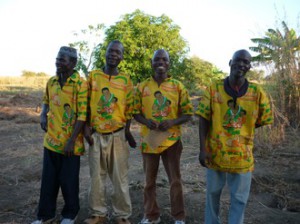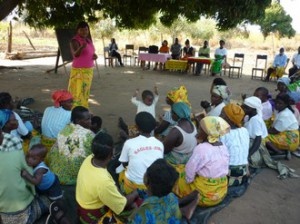(14 May 2013) There is a great demand in Malawi to come up with solutions to the country’s persistent malnutrition issues. The International Potato Center (CIP), with its project ’Rooting Out Hunger in Malawi’, has been working with relevant government agencies, NGOs, and communities to develop, cultivate and distribute new vitamin A-rich and drought-resistant orange-fleshed sweetpotato (OFSP) varieties that have significant levels of vitamin A – something white varieties don’t offer. The project, which is funded by Irish Aid, is now in its fourth year and the demand among farmers, as well as among the government agencies and the NGOs, to participate in it has far exceeded expectations. It was presented as a successful experience at Dublin’s international conference on Hunger, Nutrition and Climate Justice last month.
“Emphasis has been directed at developing the orange-fleshed varieties for dissemination and therefore increased production and consumption of the vitamin A-rich sweetpotatoes”, explains Dr. Felistus Chipungu, CIP’s major counterpart at the Department of Agricultural Research Services (DARS) of Malawi’s Department of Agriculture and Food Security, a key partner in the project and responsible for sweetpotato crop improvement and development. “Six improved and vitamin A-rich varieties have been bred since”, she adds.
“The first-phase project target of reaching 70,000 households was reached several months before the end of the first four-year phase and has been surpassed since then,” says Simon Heck, Deputy Program manager for CIP’s Africa Sweetpotato Program (SPHI). “Orange-fleshed sweetpotato has become a ‘logical’ choice for farmers, as it grows quickly and prolifically under most agro-ecological conditions; and its taste is popular, especially among children, those most vulnerable to malnutrition.”
 “The main constraint is to make good quality planting materials available to farmers,” explains Heck, “so local farmers were trained to become ‘vine multipliers’ in order to improve availability of the materials at community level, and the farmers were connected to sources of improved seed from national research stations and primary multiplication sites.” A voucher scheme was designed to subsidize planting material, while improved skills and knowledge – such as the new technique of storage in dry sand, or intercropping sweetpotato and maize or soybeans – were included in research and training.
“The main constraint is to make good quality planting materials available to farmers,” explains Heck, “so local farmers were trained to become ‘vine multipliers’ in order to improve availability of the materials at community level, and the farmers were connected to sources of improved seed from national research stations and primary multiplication sites.” A voucher scheme was designed to subsidize planting material, while improved skills and knowledge – such as the new technique of storage in dry sand, or intercropping sweetpotato and maize or soybeans – were included in research and training.
For Putri Ernawati Abidin, the Project Manager, training of the trainers – agriculturists and lead farmers – was also key to reaching grass-root level and becoming an effective model that got full support from the implementing partners. Around 4,000 change agents – 43% female – were trained, and each trainer trained another 5 to 10 people. Modules were designed on sweetpotato production, multiplication management, pests and diseases, post-harvest handling and OFSP processing, and small-scale business. All these modules align with the Scaling Up Nutrition (SUN) 1000 Special Days in Malawi, which concentrates on improving nutrition during the critical period from conception to age two.
The project has become a model by engaging in strong partnerships with relevant government services and NGOs, but also by increasing the demand for OFSP through awareness-raising, with a creative communication campaign that included radio programs, drama and theater, recipes, promotional messages on cloth worn by women (called ‘chitenje’), and even songs sung at field and demonstration days. “Let’s not forget that many people, including women, don’t have the opportunity to go to school in Malawi, resulting in high rates of illiteracy,” explains Erna Abidin. “When we started with the training in 2011, there were not many women attending. They were too shy to come because they could not read or write. After our big awareness campaign, more women participated. So we decided to rely on radio programs, drama, and songs to disseminate our message.”
 For now, the project in Malawi will undertake a major household survey later in 2013 to compare how far they have come with where they started. A next phase is in preparation for the period 2014-2018, which will continue to be supported by Irish Aid. Second-phase objectives include expanding to more districts in the country, and exploring opportunities for value-chain development to increase income and get OFSP-based processed products and cured roots with longer shelf-lives into urban markets. More partnerships will be needed, and CIP and national research partners will focus on continued technology development, and on providing higher-level training and scientific advice.
For now, the project in Malawi will undertake a major household survey later in 2013 to compare how far they have come with where they started. A next phase is in preparation for the period 2014-2018, which will continue to be supported by Irish Aid. Second-phase objectives include expanding to more districts in the country, and exploring opportunities for value-chain development to increase income and get OFSP-based processed products and cured roots with longer shelf-lives into urban markets. More partnerships will be needed, and CIP and national research partners will focus on continued technology development, and on providing higher-level training and scientific advice.
When Erna Abidin went to the Dublin Conference last month, she presented the Irish Aid-supported project next to Fanny Mafuli, a farmer and mother of three from the Phalombe district, who explained how she and her family have benefited from the voucher scheme that allowed her to become an OFSP vine multiplier. Many NGOs showed interest in an initiative that could be replicated in other countries, to fight malnutrition and also to help the poor by creating income opportunities through planting materials, using sweetpotato leaf as a vegetable, and selling fresh roots and OFSP-based processed products.
